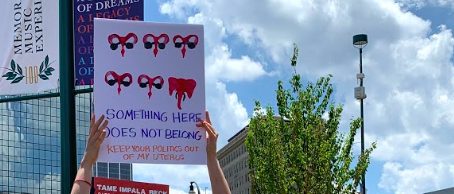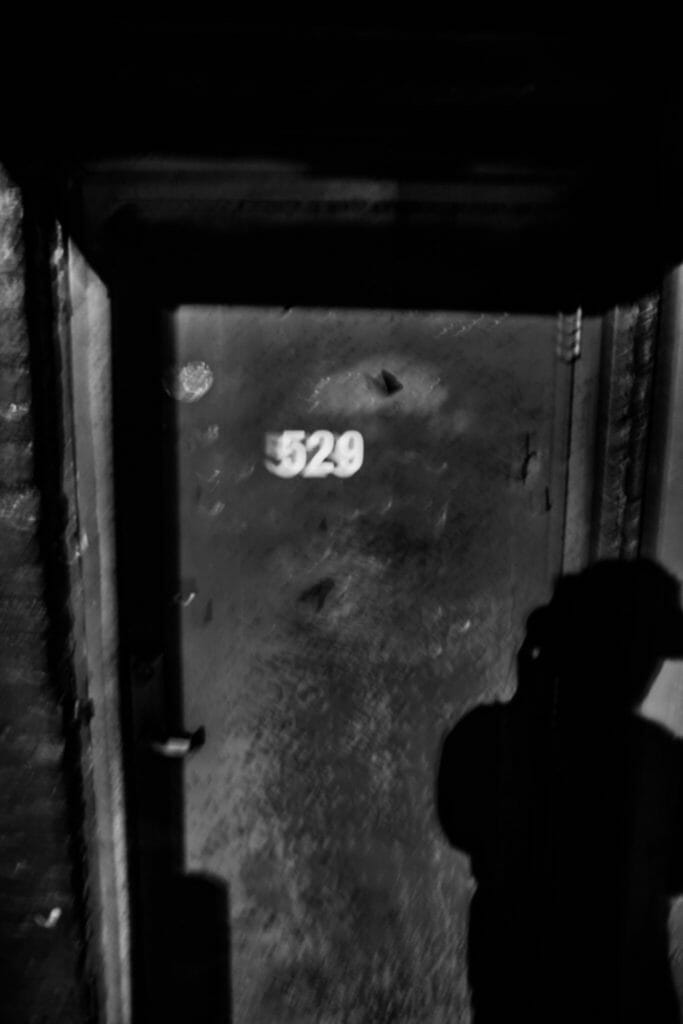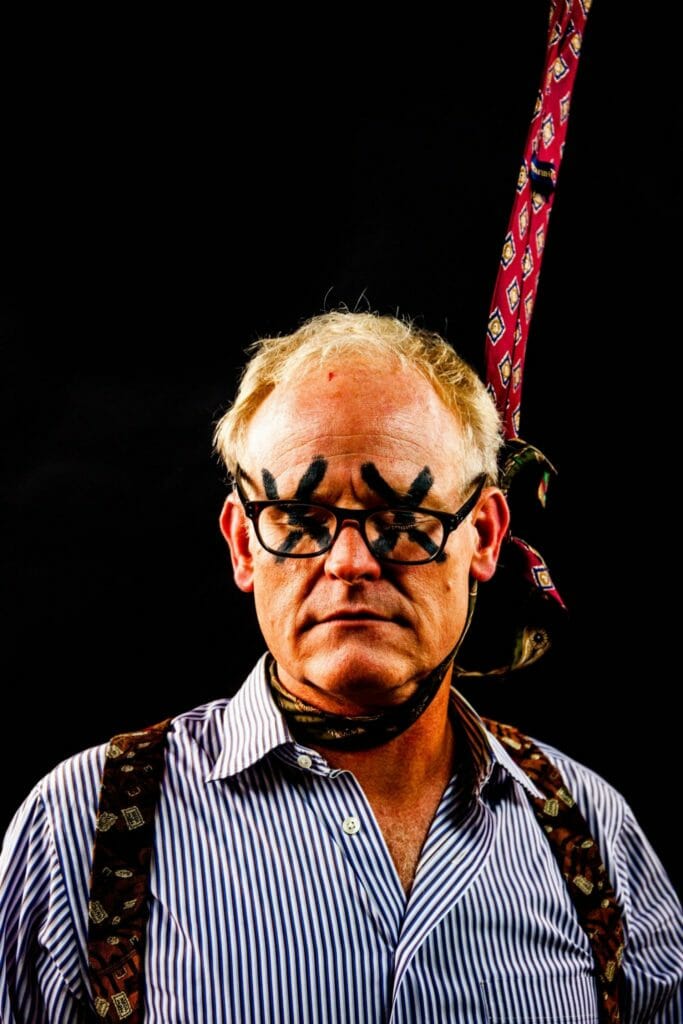Content warning: This article contains content that may be triggering in cases of varying levels of assault, gaslighting, and general trauma. It is written with the intention of empowering others in similar positions with similar experiences.
Editor\’s note: 2019 was a hectic year, but things didn\’t really start kicking for myself and many others until May 7, 2019, when newly-elected Gov. Brian Kemp signed Georgia\’s HB 481 (otherwise known as the Heartbeat Bill) to go in effect on Jan. 1, 2020. Eight other states followed suit that spring; the bills\’ legislators knew the majority of these bills would be unenforceable, but that wasn\’t the point. These abortion bans were part of a long-con scheme to overturn Supreme Court decision Roe v. Wade.
I write this note to explain that when Meghan and I attended the very first litigation hearings for GA-HB 481 last September, it was unplanned. Consider it a happy little accident. We were invited by a colleague to attend a rally outside the courthouse on Ted Turner Drive that morning, but we were led to the courtroom instead when we asked for directions. This a story of Meghan\’s experience—and while I was there sharing a similar experience in many respects, we didn\’t discuss it. It was … interesting, for lack of a better word, to hear men argue about our bodies\’ rights with such nonchalant and legalized jargon as if we weren\’t even there.
We\’ve chosen to publish this piece now to remind ourselves and others that the fight to protect the right to choose is not over. The Supreme Court has agreed to review a Louisiana case this year, and that is likely to occur in the summer of 2020—when we are elbows deep in our election cycle, possibly igniting a new World War, and God knows where we will be in the impeachment process. This piece is published alongside personal stories by yours truly and Chris Childs with the intentions of normalizing conversations of trauma, recovery, and healing with the hopes of empowering those who have suffered like we have. Because there are far too many. — Aja Arnold, founder/publisher, the Mainline
It’s Sept. 23, 2019, and I’m invited to photograph what I believe to be a rally. I wake up earlier than my typical schedule (an early 7 a.m.) and tiredly throw on my shorts and t-shirt. I assume that it will be much like any march or protest, involving a lot of walking and yelling, resulting in physical and emotional exhaustion. I look forward to documenting the experience, and envision a sea of expressional faces.

Enough daydreaming. I get it together, and am on my way, camera bag in arm. I’m running late, and still unclear of what exactly to expect as I make my way to Aja’s home. It’s early for both of us, but we jump in Aja’s car and make our way downtown. The drive is short, as we make small talk with Jenny Hval playing through the car speakers. We park and wander around an empty lot for a moment, asking directions from any security or person nearby we can find. After some searching, we walk up to the Richard B. Russell Federal Building on Ted Turner Drive in downtown Atlanta. It’s an unassumingly average door, one that no one could detect anything of importance behind. As we enter, security immediately checks our belongings and confiscates my camera and phone. I have no idea how I’m about to handle this situation, and feel quite naked. Even a little scared. We quickly accept the situation and proceed.
We begin to loop around the building several times, getting lost. A man notices us on our phone-less search, and offers to lead us accordingly. We describe the event the best we can, and he exclaims, “Oh, you wanna go where the LOUD people are!” We look at each other and agree, half out of uncertainty and half out of intrigue. The reality is we’re phoneless and hardly have a choice given our options.
We look at each other and agree, half out of uncertainty and half out of intrigue. The reality is we\’re phoneless and hardly have a choice given our options.
We trust this man and blindly step into the elevator with him and watch as he pushes a button to a higher level. His mood is quite upbeat and cheery, and I wonder what the hell he could be so happy about—but it doesn’t matter. The elevator doors open to reveal a pool of voices. As we exit, we begin to search. Hillary Holley from Fair Fight, who originally invited us to this event, is nowhere to be seen. We look around the lively crowd, assuming she’s nearby. We patiently wait, underdressed, by two doors large enough to (uncomfortably) fit a prehistoric animal. There’s a pretty thick line of Planned Parenthood reps and what appears to be members of various media sources.
An older woman with grey curls introduces herself to us. She tells us that she is representing Planned Parenthood today, and our confusion still hangs in the air with a developing touch of curiosity. Soon after, I met the CEO of Planned Parenthood Southeast, Staci Fox. We discuss the upcoming My Illegal Body (MIB) fundraiser. MIB is a project that has been constantly evolving since February 2019, and honestly the reason this journey kicked off for me.
I was on tour in Europe for months, without cell phone service and hardly any Wi-fi accessibility. Downloading day-old news podcasts, or days old news was our only source of updates or connection. As we drove down the cliffs of mountains and into impoverished ghost towns, destroyed by bombs, I remember listening to the continuous debate of the good ol\’ South: should abortion be legal? The imagery of where I was- the lack of life, and the small amount left, and what those conditions were in front of me felt like a larger painting. I could also see this in the sound of republicans voices reverberating their uninformed opinions. It struck a chord in me I had been ignoring for a long time. I could feel the fear and the anger welling up as they debated “body politics. I frantically reached out to friends when I could, and asked for help. I felt a call to do something because it was too painful not to anymore. Over the remainder of my time in Europe, I contacted who I could, when I could, and began to plan for fundraisers—anything. I had no idea what I was doing but I had to do it. And now here I was, sharing a space with a sea of people that were allies, activists, and resources. To me, this was not a means of coincidence.
I remember listening to the continuous debate of the good ol\’ South: should abortion be legal?
Staci and I are quickly interrupted mid-conversation by another woman with bright red hair. She has the appearance of a stern pre-school teacher as she orders us all to use our “inside voices,” since other cases are currently being held. I reflect on the fact that the CEO of PP is aware of our event, and MIB to be exact. It’s hardly been an hour, and I’ve been sent for a whirlwind (in the best way possible).
Hillary is still nowhere in sight, and before we can reflect on this for too long, the doors open. We’re led into a courtroom, somehow still not large enough to support this group. There are not enough seats and people shuffle around and squeeze in on the pews. Some continue to stand along the wall due to the limited availability.
“Everyone must be seated! No one is allowed to stand during this trial,” yells a middle-aged male court officer. If the rest of this case is gonna go like this—a bunch of men screaming red in the face—I cannot imagine things are about to go “well.” We squeeze onto the front row bench on the left side of the room. Looking around, I notice that there are five white men and one older woman in the first two rows on the left(the defendants). The men are all smiling confidently and shaking hands with each other, like they’ve already won. The right side is filled with the plaintiffs: Planned Parenthood/ACLU/Feminist Women’s Health Center. Another plaintiff, Sister Song, takes a seat on the left. Seemingly annoyed they remain seated. They will not be shaking anyone’s hands. The demographics of Sister Song in comparison to the blatantly one-sided defendants is hard to ignore. A diverse group of queer, femme, POC took the seats.
A man asks for media representatives to raise their hands. We look to each other as we slowly raise ours. We’re led to a rectangular box on the right side of the room, directly across from the plaintiff/defendant stand. To our right is an older man, well-groomed, with a white beard and white hair. He appears to be from another time, and sits with a typewriter and paint supplies. He’s wearing an apron and circular, metal-rimmed glasses. We must have entered a time capsule, where somehow this man can exist simultaneously with our technologically-dependent parallel universe. I have no idea what to think anymore.
The courtroom is silenced, and Aja passes me a torn paper and a highlighter to write with, along with a book to bear down on titled, The End of Men (how appropriate). We don’t have any other means of documenting, and neither of us could have fully prepared for this.
Judge Steve Jones enters the room. On the street, he wouldn’t likely pass as an intimidating man; but in this room, his face is stern and focused, with an X-ray glare designed to detect bullshit. He calls upon Susan Talcott-Camp, an attorney of the ACLU, who is representing the organization on behalf of Planned Parenthood.
She seems frail and nervous, but prepared nonetheless. She walks to the stand holding what appears to be six pounds of notes in binders and loose Post-its. She wastes no time with lengthy explanations; instead, with each question and statement, she gets directly to the point: HB 481 is much too vague. Talcott-Camp argues that based on the insufficient guidelines outlined by the law, there is no clear indication of how to detect a heartbeat accurately. Not only that, but most medical facilities neither possess nor have the funds to purchase the necessary machinery to do so. Further, she explains that the proposed bill doesn’t explain what defines a detectable heartbeat, noting the distinction between “detectable” and “detected.”
She raises the question of who is to be prosecuted in situations where the law is violated, and how that process would look. Currently, the law doesn’t provide adequate answers to these questions. She argues the unconstitutionality of it all while quickly supporting her facts and reasoning with references to Roe v. Wade and Planned Parenthood v. Casey. The judge seems to hear her out, interrupting only occasionally, though it’s hard to tell where he stands on the issue. There is a noticeably quiet tension that gradually builds in the background.
Talcott-Camp pleads that an abortion is one of the hardest and most intimate choices a person can make, and that’s exactly what it should remain: a personal choice. She holds a magnifying glass to the cruelty of the law, which disproportionately affects low-income Georgians—namely, wymn of color, who are three to four times more likely to die from complications during childbirth.
She exits the stand and is replaced by the overly confident Patrick Strawbridge, the attorney for the defendants. He’s balding, with thick-rimmed, rectangular specs. Just looking at him, I can already feel my blood boiling. He discusses “personhood,” but doesn’t offer a transparent definition of what that means—just an empty one. He rambles about detecting a heartbeat, but avoids addressing Talcott-Camp’s or Jones’ questions. He is lost in the word labyrinth he has created throughout his argument, and it ironically reflects the issue of vagueness itself that Susan had questioned. At one point he exclaims, “This isn’t a ban on abortion!”
At one point he exclaims, This isn\’t a ban on abortion! The court laughs.
The court laughs. Judge Jones crosses his arms and sits back in his chair, glasses resting on the tip of his nose. Strawbridge claims that HB 481 is actually in place to reallocate taxes to benefit single mothers. No one is buying it, of course, at least as far as we can see. He is dismissed.
Another male attorney takes the stage to defend Georgia’s “Heartbeat Bill” signed by Gov. Brian Kemp. He takes the role of the mockingbird, repeating the preceding arguments like a scratched record. Judge Jones frequently interrupts to question him. The defense attorney derails the conversation by avoiding answers, increasing his volume and talking over Jones entirely. He often repeats that “we don’t need to be considering hypotheticals here.” This part of the debate—the hypotheticals the defendant is describing—is in reference to whether or not the District Attorney of Georgia would prosecute women for terminating a pregnancy. Back in May, shortly after HB 481 was passed, the Fulton County District Attorney’s Office said it had “no plans” to prosecute wymn under the new law, citing its unconstitutionality. The DA’s Office said it has every intention of following Roe v. Wade. Insanely, this is now one of the defendants’ selling points in getting this unenforceable law past a federal judge. The plaintiffs argue that the DA’s word is not enough for wymn in Georgia to feel safe, while the defendants say the hypotheticals of the DA prosecuting are unimportant.

A seemingly amused Jones responds: “Let’s say, hypothetically, that I don’t agree with you. What does that mean for you?” The attorney’s words stumble from his mouth, and he ignores the question once again. He doesn’t discuss facts; he only insists that he doesn’t understand why everyone is so upset, since the district attorney has already stated she would not prosecute those who violated the law. Jones counters this claim by pointing out that the word of the district attorney is not something the plaintiffs can legally count on. The white male attorney is dismissed. The tension has taken a new form that is now also composed of the reverberated confusion in the room and even a tinge of fear.
Next approaches Linda Klein, representing ACLU client Sister Song. Her statement remains direct and brief while outlining the emotional, mental, and physical repercussions of the bill. She peacefully smiles as she makes her argument. “Privacy should not be a luxury,” she proclaims, adding, “The law does not allow women to participate socially and economically.\’\’ She reiterates Talcott-Camp’s assertion that abortion can be one of the most difficult decisions anyone makes in their lifetime. She dismisses herself. There is a silence that indicates that many people in the room, including myself, are reflecting at this time on their relatable experiences. Perhaps that’s projection.
I find myself dissolving into my own thoughts, reflecting on my own experiences growing up. Experiences of assault resulting in miscarriages, rape kits, gaslighting, a lifetime of genetic trauma and health issues, and how my life and my body, as well as many others’ lives and bodies, have always been threatened by the same kind of person or thing at the end of the day. I think of loved ones who experienced the same things. Whose life would have been on the line had they carried out a full term. Children without representation, never receiving justice. In a millisecond, I’m taken back to 15-year-old me, hiding my pregnancy in shame as a young girl. Crying in the upstairs bathroom at my parents\’ home while my ex-boyfriend and attacker played video games downstairs with my father, who was completely unaware. They were bonding. Laughing, even. And I was left alone to handle the fear and possibility of raising a child. A child I didn’t ask for. I was left alone to cry in secret everyday. To make it worse, my rape was public. A spectacle. I could clearly hear the voices of classmates slutshaming me over and over in my head. I thought of the older male teachers who touched me, or looked at me in ways that made me feel gross. Not only was I assaulted, but I was the whore. And a pregnant one.
In a millisecond, I\’m taken back to 15-year-old me.
I was always hiding, too scared to tell my family and knowing we could not afford an abortion. I was scared, because this was not the first time I had been raped. Or the second. Or the third. My family had turned a blind eye to several incidents throughout my life since I was a child, who would I turn to now? Would anyone listen? Who could I trust? When I turned to a friend, she too was “too tired” to hear my cries, and fell asleep. She proceeded to have “normal” conversations with me, as though I never told her such a thing. How was I going to handle this alone, again?
Then, “luck” hit me, and I had a miscarriage; although I didn’t know at the time because I was too sheltered. The thick blood poured out of my body, painfully—the body that never felt like it belonged to me. The problem “solved itself. Would I have gotten an abortion? Absolutely, somehow. But not because it was a choice I would have made without “thought or care”, which somehow always becomes a question of character with pro-lifers. Not because the feelings I had to manage as a fifteen-year-old child were easy. There was nothing else for me, and I didn’t want my life to end there. I couldn\’t have a constant reminder, either. Like I said, I had the “easy” way out, which only meant my body chose for me. People in my life have made this choice before, and each of them for their own valid reasons.
Would I have gotten an abortion? Absolutely, somehow. But not because it was a choice I would have made without thought or care, which somehow always becomes a question of character with pro-lifers.
The repressed silence and pain of several occurrences throughout my life thematically revolving around my body have prevailed, and the pain has never truly gone away. The anger and tears began to grow inside me as I forcibly watched these overly confident men take the stands, the whole scenario once again mirroring countless instances of being forced to endure recurring forms of oppression by various men throughout my life. I could only see the irony here, as they repeatedly and volunteered their opinions as though they were the truth, so “matter-of-factly.” My body, which has been used against me so many times, is on fire in this moment. For four-year-old me. For 15-year-old me. For 18-year-old me. For 21-year-old me. And the 26-year-old me, the child and the woman attached to this body, that was now sitting in this box. The same scared little girl, the silent and cowering young woman, had been seeking refuge inside of me, only coming out of hiding occasionally when beckoned by triggering injustices. Both of them will always be there. All of these versions of me want some form of justice. For myself and the other wymn/people who have ever experienced this lack of control over their own body. I release my clenched palms and come back to the present moment.
My body, which has been used against me so many times, is on fire in this moment. For four-year-old me. For 15-year-old me. For 18-year-old me. For 21-year-old me. And the 26-year-old me, the child and woman attached to this body that was now sitting in this box.
I am sitting in the chair, highlighter and torn papers in hand. I’ve been writing so quickly and furiously I can hardly read my notes. I prepare to have some difficulty sifting through them. I draw my attention back yet again. I ponder how many other people in this room at this moment are also having their own moments. And if because of that, it’s a struggle to follow some of the case. Because it is for me.

Following Klein’s statement (and my flashback), Talcott-Camp rejoins, closing with the argument that no state interest is strong enough to support banning abortion before viability. She says she cannot “overstate her case that this is unconstitutional,” and dismisses herself back to her seat. Silence again.
In closing, Jones agrees to uphold the law no matter what, and issues that the case will enter a state of discovery. This, he says, should give both sides more than enough time to figure out the following steps. The uncertainty has grown. It could take months for a decision to be made. Everyone quietly exits the courtroom, mutually puzzled. The loud and lively banter that occurred upon arrival into the courtroom has shrunk into silent perplexity. We leave our old selves behind, collect our possessions, and exit the building.
As a final note, months have passed since this article was originally written, and there has been external/internal reflection. Our MIB fundraising event sparked a resurgence of support in the community, as well as protesters. It was more successful than we could have imagined, and seeing a small group of pro-lifers appear to protest was taken as a strange sign of validation—we were doing something right. However, the fear didn’t leave (and still hasn’t).
On Oct. 1, 2019—just about a week after the case’s first litigation hearing and a few days after MIB took place—Judge Jones issued a temporary block against HB 481. While this was (and is) a victory for many, it does not mean the overall fear or threat has magically dissipated. The Republicans’ persistence and the oppression on which they stand on will not falter for one second. Therefore, we can not give up on justice. There is always more work to be done, and I for one have a feeling it’s not over. I would like to conclude by reminding everyone that there are still many aspects and lenses to gaze into, and that the community will need to remain determined to fight when they can. To summarize a quote stored in my memory from Staci at the MIB fundraiser:
“The doors (at Planned Parenthood) are open. Let’s keep it that way.”




